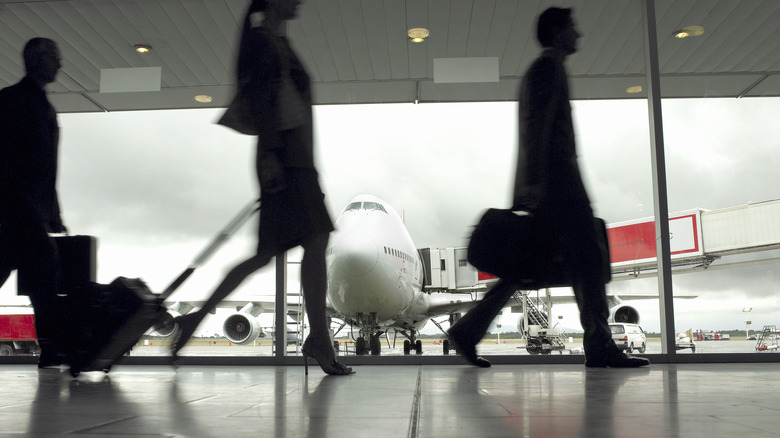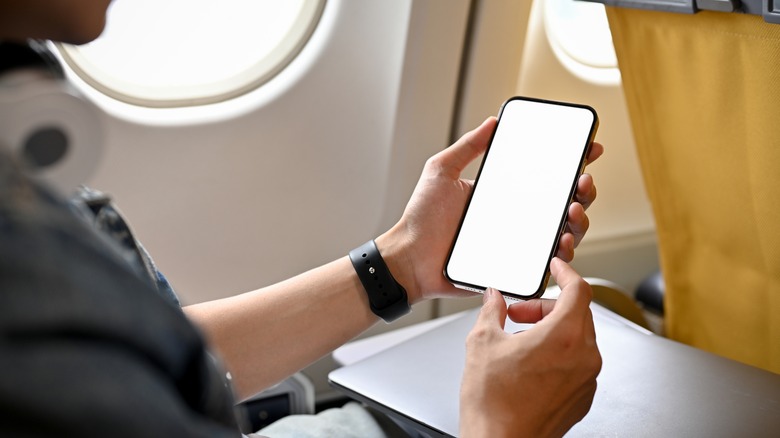Have A Tight Connection? Here's Why You Should Contact Your Airline
While traveling is typically a fun adventure, the pleasure of embarking on a getaway rarely comes without at least a little bit of struggle. Among all the things that can go wrong with jet-setting, missing a connecting flight nearly tops the list of worst-case scenarios. It can mean being stranded at an airport (potentially in a country in which you have no preparation to spend time), scrambling to rebook an often costly new flight, arriving at your final destination much later than planned (an automatic damper if your travel is time-sensitive), and in many cases, increasing the risk of checked luggage being lost along the way.
If you have a flight coming up with a tight connection, however, there are plenty of preventative steps you can take to ensure your travels stay as stress-free as possible; chief among them is contacting your airline in advance. You should, of course, keep in contact with the airline on the day of your flight to stay abreast of any changes, because some airlines automatically rebook passengers when they deem the connection too tight — but there are also many measures you can take long before you take off on that flight with the 45-minute layover. Expressing concerns prior to travel will ensure that there's an alternative plan should the connection be missed, whether it be due to rushing through a large airport or the first flight departing late.
Steps to take prior to air travel
Booking directly through the airline increases the odds that it will help you out. When booking through a third-party travel site, you risk having a tight connection with a separate airline (for example, the first flight is United, and the second is Spirit), meaning that you have to not only rush through an airport but also endure the check-in process all over again. In these cases, the second airline is under no obligation to assist you.
If your schedule allows it, ask the second airline if there's a connecting flight later that day. While spending three to four hours in an airport might not seem ideal, it's certainly better than missing your flight altogether. The first airline, meanwhile, may be able to assist you in reserving a seat close to the front of the plane on your flight, a time-saving hack for getting off the plane quickly and on the way to your connection.
While the Department of Transportation does not legally obligate U.S.-based airlines to compensate stranded travelers, calling the airline ahead of time can better help you understand what the airline is willing to compensate (often a hotel or at least a meal) should you miss that tight connection. Some airlines will even put you on the next available flight for free if it's on the same ticket or itinerary, but you definitely want to be sure ahead of time whether this is an option.
Other factors to consider with a tight connection
One of the most essential steps to take when traveling with a short layover is to avoid checking luggage if possible. It's already anxiety-inducing to travel with a tight connection, so imagine how much worse it would be to arrive at your final destination only to learn your bag didn't make it. There are many packing strategies to help you minimize what you carry, but if you're traveling with a lot of clothing and don't feel it can fit in a carry-on, invest in some compression bags. You'll be surprised just how much can fit into one tiny suitcase — but of course, make sure to check it against your airline's specific carry-on dimensions after you pack it to the brim.
Alternatively, if you have the time, why not extend your layover? Another reason to contact your airline in advance is that many, including but not limited to Copa Airlines and IcelandAir, will allow passengers to extend their layovers in their respective home airports. Other airlines, like Turkish Airlines, offer a complimentary tourist service for layovers of a certain length. Layovers for various airlines and locations range anywhere from a few hours to several days, allowing travelers to explore a new city or country — often at no additional airfare cost. This is a savvy, money-saving trick to see an additional destination and a great way to ensure you won't miss that connecting flight.


